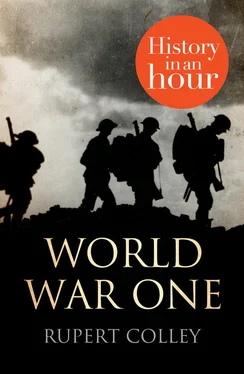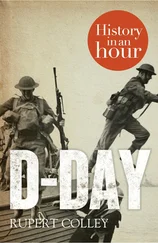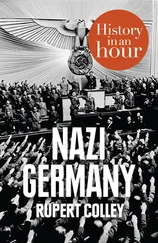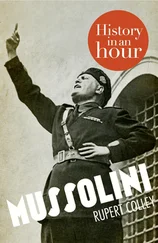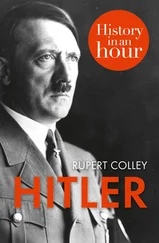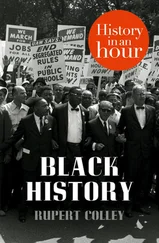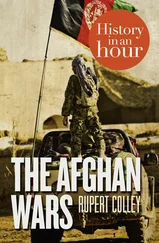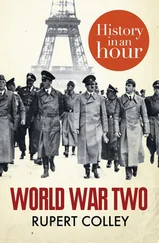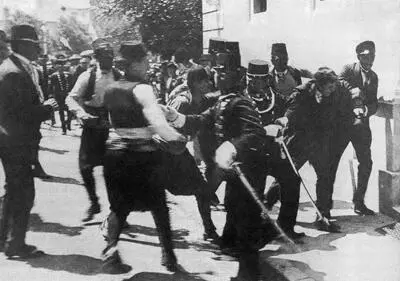
Gavrilo Princip wrested to the ground
The Archduke, having delivered a speech, decided to visit the wounded driver in hospital. On his way, his driver took a wrong turning down a one-way street, a street named after Franz Ferdinand’s uncle the emperor, Franz Joseph, along which was a tavern. Princip, astonished to see the royal car, acted on impulse. Jumping onto the running board as the driver tried to engage the reverse gear, he fired two shots. Mortally wounded, Franz Ferdinand’s last words were: ‘Sophie, stay alive for the children’. It was not to be. The Archduke and his wife died together. It was their fourteenth wedding anniversary.
The Road to War
The assassination of Franz Ferdinand had very much been the work of Princip and his band of Black Hand conspirators but the Austrian–Hungarian empire saw an opportunity to assert its authority over Serbia. First it sought reassurance from its powerful ally, Germany. Together, they had formed the Dual Alliance in 1879 which, three years later, became the Triple Alliance when Italy added its signature. Now, the German Kaiser, Wilhelm II, gave Austria-Hungary the assurance it needed, then promptly went off on a cruise around Norway.
It took the Austrian–Hungarian government three weeks but the ultimatum they sent Serbia was, in the words of Britain’s foreign secretary, Sir Edward Grey, the ‘most formidable document ever sent from one nation to another’. Serbia was given forty-eight hours to comply with ten demands, specifically designed to humiliate and therefore be rejected. Although the Serbs agreed to eight, it was never going to be enough for the bellicose Austrian–Hungarians and on 28 July they declared war on Serbia.
Events now moved quickly, one triggering off another. In response to this declaration of war, Russia, which saw itself as protector of Serbia, began to mobilize. France, Russia’s ally since 1892, offered her its support. In response, the Germans gave Russia twelve hours to halt its mobilization. The deadline passed, thus on 1 August, Germany declared war on Russia and, two days later, on France. ‘The sword has been forced into our hand,’ claimed the Kaiser.
The Schlieffen Plan Contents Cover Title Page WORLD WAR ONE History in an Hour Rupert Colley About History in an Hour Introduction Assassination of an Archduke The Schlieffen Plan The Eastern Front Global War The War in Britain The Western Front Gallipoli The Ottoman Empire Verdun Trenches Change at the Top Air and Sea Ireland and Easter Monday Russia and Revolution USA Passchendaele The Spring Offensive, 1918 The Hundred Days Armistice Paris Peace Conference The War to End War? Appendix 1: Key People Appendix 2: Timeline of World War One Copyright Got Another Hour? About the Publisher Конец ознакомительного фрагмента. Текст предоставлен ООО «ЛитРес». Прочитайте эту книгу целиком, купив полную легальную версию на ЛитРес. Безопасно оплатить книгу можно банковской картой Visa, MasterCard, Maestro, со счета мобильного телефона, с платежного терминала, в салоне МТС или Связной, через PayPal, WebMoney, Яндекс.Деньги, QIWI Кошелек, бонусными картами или другим удобным Вам способом.
Germany now faced a war on both its western and eastern borders; a war on two fronts. But it was a prospect they had long anticipated. In 1905, the then German Chief of Staff, Count Alfred von Schlieffen, had devised a plan for such an eventuality. Russia, he surmised, not incorrectly, would take up to six weeks to mobilize its armies, allowing Germany time to defeat France. In order to avoid the line of fortifications on the Franco-German border, the German army would have to advance through neutral Belgium in a huge sweeping movement: ‘let the last man on the right brush the Channel with his sleeve’. Having knocked out Belgium, it would swing south, covering twenty kilometres a day, and encircle Paris. Having dealt with the French, it would then have time to move east to confront the vast armies of Russia. Schlieffen died in 1913. One year later, his grand plan was put into action.
Speed was of the essence. On 2 August, Germany stormed through Luxembourg and demanded immediate access through Belgium. But ‘Poor little Belgium’, as the British press called her, refused and turned to a 1839 treaty, guaranteeing its neutrality. One of the signatories was Germany. The other was Great Britain. Britain asked Germany for an assurance that they would respect Belgium’s neutrality. Germany ignored it and on 4 August began bombing the city of Liège. Germany could not believe that Britain would go to war with a ‘kindred nation’ over a ‘scrap of paper’ – a treaty signed seventy-five years before. Britain declared war on Germany on 4 August. Sir Edward Grey, gazing out from the Foreign Office, remarked, ‘the lamps are going out all over Europe. We shall not see them lit again in our lifetime’.
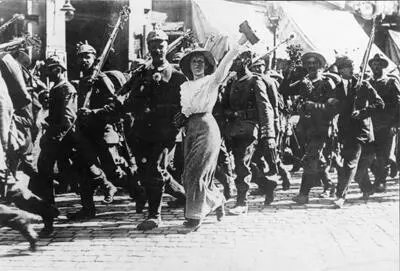
The German army goes off to war, August 1914 Deutsches Bundesarchiv Bild 183-25684-0004
Grey, in his gloominess, was in a minority – the rest of Europe rejoiced at the prospect of war. Everywhere, civilians gathered in town squares to celebrate, young men anticipated adventures of derring-do and chivalry. ‘It’ll all be over by Christmas’, the British army was told; ‘You’ll be home before the leaves fall’, declared the Kaiser to his troops. For the Russian Tsar, Nicholas II, a victorious war would stifle the murmurings of revolution that was infecting his kingdom. For France, still chafing over its defeat in the Franco–Prussian War in 1871, war offered a chance to re-establish its reputation.
Unlike her European counterparts, Britain had no standing army, only a small professional force, the British Expeditionary Force (BEF), numbering a mere 100,000 men (compared, for example, to Germany’s 1.1 million). It was this tiny army that arrived in northern France to bolster the French effort. The Kaiser dismissed the BEF as a ‘contemptible little army’, hence British soldiers took pride in calling themselves the ‘Old Contemptibles’.
The first major confrontation between the Great Powers took place in the Belgium town of Mons on 23 August; Britain’s first battle on mainland Europe since Waterloo almost a century before. The ‘contemptible’ BEF, despite being outnumbered three to one, inflicted huge casualties on the Germans, delayed their advance, and then retreated in good order. The Retreat from Mons was, as legend would have it, guided by the ‘Angels of Mons’, ghostly apparitions who safely led the British soldiers away from the battlefield.
The Germans advanced through France but were rapidly running out of steam, too exhausted to maintain the momentum. By early September they had reached the River Marne, only thirty miles north of Paris. The military commander of Paris, General Joseph Gallieni, was old enough to remember 1871 when the Prussians, Germany’s predecessors, had besieged the capital to the point of starvation. He had no intention of allowing the Germans anywhere near Paris again.
After three days of fighting at the Marne, the Germans looked poised to break through the French and British forces, and onto Paris. Gallieni was to send reinforcements but while he had the troops he had no means to transport them north. In a flash of ingenuity, he seized every available Parisian taxi – 600 of them – crammed each one full of soldiers and sent them on their way to meet the army of the French commander-in-chief, General Joseph Joffre.
Читать дальше
